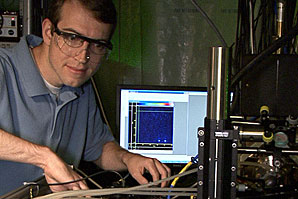Scientists unveil first programmable quantum processor
American researchers have unveiled the first universally programmable quantum processor.


American scientists have shown off the first ever quantum information processor to be "universally" programmable.
The demonstration by National Institute of Standards and Technology researchers is the first time such quantum computing has performed programmable processing, running more than one task.
The processor stores binary data in electrically charged atoms, which are held electromagnetically and manipulated with lasers, letting scientists work with the quantum bits, called qubits.
"This is the first time anyone has demonstrated a programmable quantum processor for more than one qubit," said NIST postdoctoral researcher David Hanneke, in a statement.
"It's a step toward the big goal of doing calculations with lots and lots of qubits. The idea is you'd have lots of these processors, and you'd link them together," he added.
According to a statement from NIST: "NIST scientists can manipulate the states of each beryllium qubit, including placing the ions in a superposition' of both 1 and 0 values at the same time, a significant potential advantage of information processing in the quantum world. Scientists also can entangle' the two qubits, a quantum phenomenon that links the pair's properties even when the ions are physically separated."
While it might sound all a bit much, quantum computing could be used for such everyday tasks as encryption. Still, more qubits will be needed to work out bigger problems and accuracy must first improve, so the research is still in its early stages.
Sign up today and you will receive a free copy of our Future Focus 2025 report - the leading guidance on AI, cybersecurity and other IT challenges as per 700+ senior executives
Freelance journalist Nicole Kobie first started writing for ITPro in 2007, with bylines in New Scientist, Wired, PC Pro and many more.
Nicole the author of a book about the history of technology, The Long History of the Future.


